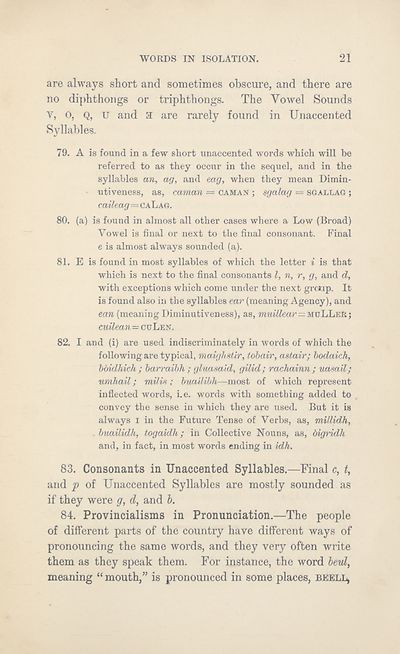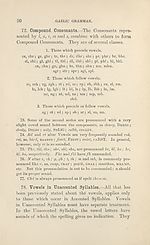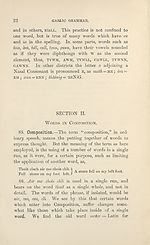Download files
Complete book:
Individual page:
Thumbnail gallery: Grid view | List view

WORDS IN ISOLATION.
21
are always short and sometimes obscure, and there are
no diphthongs or triphthongs. The Yowel Sounds
V, O, Q, u and a: are rarely found in Unaccented
Syllables.
79. A is found in a few short unaccented words which will be
referred to as they occur in the sequel, and in the
syllables an, ag, and eag, when they mean Dimin¬
utiveness, as, caman = caman ; sgalag = sgallag ;
caileag=caLag.
80. (a) is found in almost all other cases where a Low (Broad)
Vowel is final or next to the final consonant. Final
e is almost always sounded (a).
81. E is found in most syllables of which the letter * is that
which is next to the final consonants l, n, r, g, and d,
with exceptions which come under the next group. It
is found also in the syllables ear (meaning Agency), and
ean (meaning Diminutiveness), as, muUlear=moLLeRj
cm'Zeare = cuLen.
82. I and (i) are used indiscriminately in words of which the
following are typical, maighstir, tobair, astair; bodaich,
boidhich ; barraibh ; gluasaid, gilid; rachainn ; uasail;
umhail; milis ; buailibh—most of which represent
inflected words, i.e. words with something added to
convey the sense in which they are used. But it is
always I in the Future Tense of Verbs, as, millidh,
. buailidh, togaidh; in Collective Nouns, as, digridh
and, in fact, in most words ending in idh.
83. Consonants in Unaccented Syllables.—Final c, t,
and p of Unaccented Syllables are mostly sounded as
if they were g, d, and b.
84. Provincialisms in Pronunciation.—The people
of different parts of the country have different ways of
pronouncing the same words, and they very often write
them as they speak them. For instance, the word beul,
meaning “mouth,” is pronounced in some places, beell,
21
are always short and sometimes obscure, and there are
no diphthongs or triphthongs. The Yowel Sounds
V, O, Q, u and a: are rarely found in Unaccented
Syllables.
79. A is found in a few short unaccented words which will be
referred to as they occur in the sequel, and in the
syllables an, ag, and eag, when they mean Dimin¬
utiveness, as, caman = caman ; sgalag = sgallag ;
caileag=caLag.
80. (a) is found in almost all other cases where a Low (Broad)
Vowel is final or next to the final consonant. Final
e is almost always sounded (a).
81. E is found in most syllables of which the letter * is that
which is next to the final consonants l, n, r, g, and d,
with exceptions which come under the next group. It
is found also in the syllables ear (meaning Agency), and
ean (meaning Diminutiveness), as, muUlear=moLLeRj
cm'Zeare = cuLen.
82. I and (i) are used indiscriminately in words of which the
following are typical, maighstir, tobair, astair; bodaich,
boidhich ; barraibh ; gluasaid, gilid; rachainn ; uasail;
umhail; milis ; buailibh—most of which represent
inflected words, i.e. words with something added to
convey the sense in which they are used. But it is
always I in the Future Tense of Verbs, as, millidh,
. buailidh, togaidh; in Collective Nouns, as, digridh
and, in fact, in most words ending in idh.
83. Consonants in Unaccented Syllables.—Final c, t,
and p of Unaccented Syllables are mostly sounded as
if they were g, d, and b.
84. Provincialisms in Pronunciation.—The people
of different parts of the country have different ways of
pronouncing the same words, and they very often write
them as they speak them. For instance, the word beul,
meaning “mouth,” is pronounced in some places, beell,
Set display mode to:
![]() Universal Viewer |
Universal Viewer | ![]() Mirador |
Large image | Transcription
Mirador |
Large image | Transcription
| An Comunn Gàidhealach > An Comunn Gàidhealach Publications > Scottish Gaelic as a specific subject > (25) |
|---|
| Permanent URL | https://digital.nls.uk/125955317 |
|---|
| Description | This contains items published by An Comunn, which are not specifically Mòd-related. It includes journals, annual reports and corporate documents, policy statements, educational resources and published plays and literature. It is arranged alphabetically by title. |
|---|
| Description | A collection of over 400 items published by An Comunn Gàidhealach, the organisation which promotes Gaelic language and culture and organises the Royal National Mòd. Dating from 1891 up to the present day, the collection includes journals and newspapers, annual reports, educational materials, national Mòd programmes, published Mòd literature and music. |
|---|---|
| Additional NLS resources: |
|

